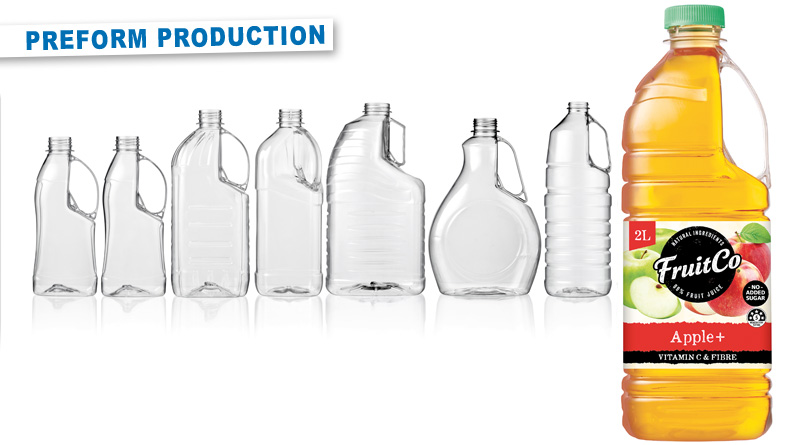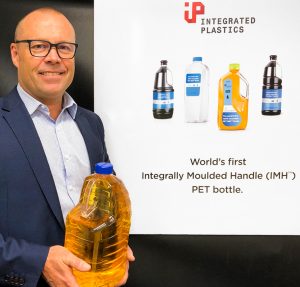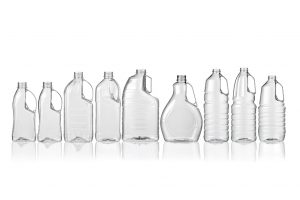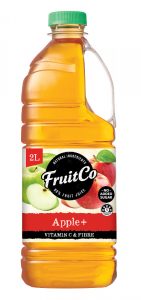PET bottle handles produced during the preform phase
Interview with Integrated Plastics Pty. Ltd
October 15, 2020
We met: Mr Nicholas Mellen, Managing Director
In the Villawood district some 30 km west of Sydney city centre, Integrated Plastics have been working on an effective, market-ready solution for bottles and containers with integrated handles since 2010 with a view to launching a global licensing business for PET converters and bottle producers. The handle’s material and the process involved are special features of the technology. The patented idea relies exclusively on PET and rPET for the handle and, unlike other more conventional technologies, is produced with the preform at the preform stage. This allows the company to achieve key objectives such as ideal recyclability of the whole container, together with savings in weight and material compared with other combinations of plastics and production output. We spoke to Integrated Plastic’s Managing Director, Mr Nicholas Mellen, about the concept and the development of what he says is a unique product that can be promoted worldwide.
Origins and development
“Integrally Moulded Handle” or IMH as the company calls it is what experts most closely associate with extrusion processes or subsequently inserted HDPE handles. One occasionally comes across moulded grips which, for process-specific reasons, are moulded rather than recessed for effective finger insertion.
The introduction of the IMH means that previous technical limitations should now be a thing of the past with the whole container also guaranteed to be 100% recyclable. The initial IMH idea was developed by the Australian company, B&R, which started production for the first time in 2006 as the licensor. “We were really excited by the idea, acquired the relevant licence in 2012, founded Integrated Plastics and began producing bottles with handles”, explained Managing Director and Co-Founder, Nicholas Mellen. The entrepreneur has 20-years’ experience in the plastics industry and runs the company with David Ramirez, Manufacturing Manager, Lead Innovation and R&D and Ganesh Krishnan, Global Head of Projects, Lead Innovation and R&D.
Process and production systems were continually updated over the ensuing years. “We began by using a 140g preform for 4l bottles and produced other IMH bottle types up until 2014 such as 2 l varieties weighing between 75g and 85g which were produced using an ADS Linear Blow Moulding System.
We also developed an 8-cavity mould for an ergonomic grip over the same period”. Other machines were acquired over the next few years, e.g. from Sidel and the Indian machinery builder, SAP Blowtek. Integrated Plastics also signed a partnership agreement with the well-known former boss of Sidel India, Mr Subba Bangera. Finally, from 2016 onwards, the company moved into increasingly competitive markets in terms of its production capacity by developing bigger cavities such as a 16-cavity mould for 2l IMH bottles and the use of a rotary blower developed together with South Korean machine builder, SDB.
Mr Mellen went on. “We applied for several patents after 2012 but kept our marketing and public relation plans on hold until 2018 to ensure we were able to enter the market with a technology that was proven to meet customer need, as well as being environmentally-friendly. In 2018, we finally acquired B&R Industries and Sangraal, Australia who were the original developers of early integral handle patents giving us 100% control of all patents, designs and prior art globally. We then launched the technology worldwide.”
“Although licensing and development are Integrated Plastic’s two main business areas, in-house production currently also contributes 80% of the company’s overall turnover.
Over time, the bottles came to the attention of decision-makers in Europe, Asia and the Middle East which culminated in all international patent rights being agreed in 2018. Since then, the company has held all the technology’s global patents, some of which date back to the 1990s.”
The technology, process and application
The exact process remains a company secret but according to Integrated Plastics, IMH preforms can be produced either on existing equipment with uncomplicated conversion achieved by simply changing the mould, or by purchasing a new injection moulding machine for dedicated IMH production systems.
“Conventional PET injection moulding machines are standard here, while compatible preform moulds can be bought from our licence partners, Classic Tools, GDXL, Husky Injection Moulding, Kisan and Sipa. A special machine developed in partnership with the South Korean firm, SDB, is now used in the blow moulding process”, said Mr Mellen. “Two-stage ISBM machines can be fitted with 1, 2, 4, 6 or 8-cavities and can produce around 4,000 1 l bph in a 4-cavity configuration using the rotary system. A 12-cavity mould is currently being developed.”
The standard portfolio range includes more than 25 different bottle types for the drinks, catering and non-food industries. PET and rPET can be processed equally well within an intrinsic viscosity range of 0.76 to 0.84 decilitre/gram, including hot-fill and fast reheatable varieties. Savings of up to 30% should be possible as a result of high production capacity compared to other processes. The fact that the handle has already been moulded during preform production should make it easier to optimise wall and handle thickness. “A 2l IMH bottle can weigh anywhere between 69 g and 75 g, whereas the weight of the extrusion area and the subsequent handle attachment can be between 80 g and 96 g, not forgetting the generally lower PET price compared to HDPE. Logistics for the converters are also made easier given IMH preforms are made centrally and can be blown either in-house or at outsourced bottle filling plants.
The shape is typically based on the usual customer bottle design to minimise costs that might be incurred for any modifications made at the plant. As well as designs developed in-house, licensees can also use standard and customer bespoke bottle shapes internationally. The number of bottle designs within the IMH family is constantly expanding thanks to the efforts of everyone involved.
Present and future developments
In Australia, the company currently has a 57% market share in the sector which, according to Mr Mellen, continues to grow steadily. “While 1 l and 2 l are the country’s most popular bottle sizes, other potential markets are on the lookout for 1.5 l to 4 l bottles with their own special design. Without saying too much about which companies are involved, the efforts of bottlers worldwide to achieve sustainability, recycling and ergonomics will result in IMH bottles appearing more and more on international shelves during 2021.”
New global bottler distributors will be coming on board from February 2021, with several currently in the pipeline. According to Mr Mellen, Tru Blu Beverages’ sales are expected to increase by 50% in 2021. Tru Blu as the main local customer is involved in nearly all of the soft drink markets with 25 brands, as well as being the country’s largest privately-owned drinks’ producer. Tru Blu has successfully distributed more than 100 million IMH bottles on the Australian drinks’ market since 2018, including several OEM brands for retail chains such as Woolworth Coles, Aldi and IGA.
Integrated Plastics use virgin PET material purchased from Reliance Industries in its preform production, while rPET is obtained from the Martogg Group. The licence partner and material manufacturer, Sabic, supplies the Middle East region, while SDB uses local manufacturers in South Korea. “Tru Blu are currently expanding their production capacity and, with our help, are adding two inline blow moulding machines for IMH hot-filling applications, as well as increasing their annual output to 50 million bottles. We are also in the process of building new capacity with extra production space set aside in Sydney for prototyping. We want to open a plant in India with centralised production of IMH preforms for the local market”, said Mr Mellen.
The company currently employs around 20 full-time development and production staff at its Villawood facility and has a current turnover of US$5 million. “Fortunately, Australia is coping pretty well with the Covid pandemic compared to other countries”, said Mr Mellen. “This year, we have been focusing increasingly on digital conversation, teamwork and remote management which, while progressing well, are certainly no substitute for face-to-face meetings. We are therefore looking forward to hopefully travelling abroad again soon.”




